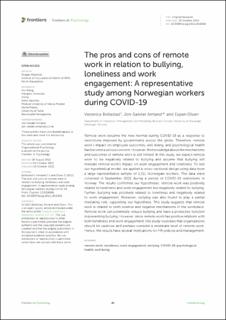| dc.contributor.author | Bollestad, Veronica Svihus | |
| dc.contributor.author | Amland, Jon-Sander | |
| dc.contributor.author | Olsen, Espen | |
| dc.date.accessioned | 2023-01-04T07:19:58Z | |
| dc.date.available | 2023-01-04T07:19:58Z | |
| dc.date.created | 2022-12-01T09:16:46Z | |
| dc.date.issued | 2022 | |
| dc.identifier.citation | Bollestad, V., Amland, J. S., & Olsen, E. (2022). The pros and cons of remote work in relation to bullying, loneliness and work engagement: A representative study among Norwegian workers during COVID-19. Frontiers in psychology, 13, 6717. | en_US |
| dc.identifier.issn | 1664-1078 | |
| dc.identifier.uri | https://hdl.handle.net/11250/3040803 | |
| dc.description.abstract | Remote work became the new normal during COVID-19 as a response to restrictions imposed by governments across the globe. Therefore, remote work’s impact on employee outcomes, well-being, and psychological health has become a serious concern. However, the knowledge about the mechanisms and outcomes of remote work is still limited. In this study, we expect remote work to be negatively related to bullying and assume that bullying will mediate remote work’s impact on work engagement and loneliness. To test our hypothetical model, we applied a cross-sectional design using data from a large representative sample of 1,511 Norwegian workers. The data were collected in September 2021 during a period of COVID-19 restrictions in Norway. The results confirmed our hypotheses: remote work was positively related to loneliness and work engagement but negatively related to bullying. Further, bullying was positively related to loneliness and negatively related to work engagement. Moreover, bullying was also found to play a partial mediating role, supporting our hypothesis. This study suggests that remote work is related to both positive and negative mechanisms in the workplace. Remote work can potentially reduce bullying and have a protective function in preventing bullying. However, since remote work has positive relations with both loneliness and work engagement, this study illustrates that organizations should be cautious and perhaps consider a moderate level of remote work. Hence, the results have several implications for HR policies and management. | en_US |
| dc.language.iso | eng | en_US |
| dc.publisher | Frontiers | en_US |
| dc.rights | Navngivelse 4.0 Internasjonal | * |
| dc.rights.uri | http://creativecommons.org/licenses/by/4.0/deed.no | * |
| dc.title | The pros and cons of remote work in relation to bullying, loneliness and work engagement: A representative study among Norwegian workers during COVID-19 | en_US |
| dc.title.alternative | The pros and cons of remote work in relation to bullying, loneliness and work engagement: A representative study among Norwegian workers during COVID-19 | en_US |
| dc.type | Peer reviewed | en_US |
| dc.type | Journal article | en_US |
| dc.description.version | publishedVersion | en_US |
| dc.rights.holder | The author | en_US |
| dc.subject.nsi | VDP::Samfunnsvitenskap: 200 | en_US |
| dc.source.volume | 13 | en_US |
| dc.source.journal | Frontiers in Psychology | en_US |
| dc.identifier.doi | 10.3389/fpsyg.2022.1016368 | |
| dc.identifier.cristin | 2086632 | |
| cristin.ispublished | true | |
| cristin.fulltext | original | |
| cristin.qualitycode | 1 | |

